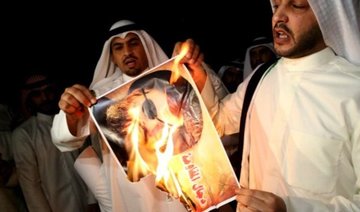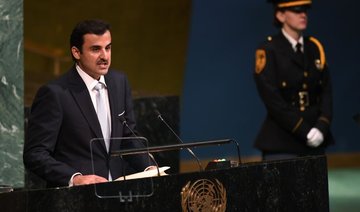BEIRUT: Kuwait’s Emir Sheikh Sabah Al-Ahmad Al-Jaber Al-Sabah and Lebanese President Michel Aoun called for increased Arab unity at the official Lebanese-Kuwaiti talks in Kuwait on Tuesday.
The two leaders announced plans to improve cooperation between the countries and highlighted the need for joint action, and to seize the chance to unite Arab stances and restore solidarity during the upcoming Arab Summit.
Kuwait’s emir and Lebanon’s president also condemned the US decision to recognize Jerusalem as the capital of Israel in a statement released after the summit.
President Aoun expressed his gratitude “for Kuwait’s support for Lebanon in all circumstances.”
He requested that Kuwait participate in all three conferences for supporting Lebanon: The Rome Conference, the Paris Conference and the Brussels Conference, which will be held next month.
According to the Press and Information Office at the Baabda Palace, Emir Al-Sabah told President Aoun during a one-on-one meeting that “he has given his directives to the Kuwait Fund for Arab Economic Development to provide Lebanon with economic support and respond to its needs.”
He also said: “We will not hesitate to help Lebanon, whether directly or through international conferences.”
Kuwait’s emir believes his country’s current membership of the UN Security Council “can help highlight the rightness of Arab causes.”
According to his press office, Aoun said that Lebanon’s current stability encouraged investment and contribution to the economic development plan currently being developed.
He also referred to the suffering of Syrian refugees in Lebanon and the repercussions of their presence on Lebanon’s economy, social life and security conditions.
President Aoun arrived in Kuwait on Tuesday for an official two-day visit, during which he will meet Kuwaiti officials and members of the Lebanese community living there.
The Lebanese-Kuwaiti summit was held in the conference hall at the Bayan Palace.
It began with general talks followed by two bilateral meetings. The talks were attended by Aoun’s official delegation, which consists of Gebran Bassil, Jamal Jarrah, Ayman Choukair, Inaya Ezzeddine and Kuwaiti officials, including Deputy Foreign Minister Khaled Al-Jarallah, Adviser Mohammed Abdullah Abu Al-Hasan and Kuwait’s Ambassador to Lebanon Abdul-Al Al-Qena’i.
Minister of Amiri Diwan Affairs Sheikh Ali Jarrah Al-Sabah said in a statement published by KUNA that the visit had been productive.
“The talks between Lebanon and Kuwait reviewed the bilateral relations between the two countries, their people, and ways to improve them in all fields to meet their aspirations and expand the scope of cooperation between Kuwait and Lebanon in a manner that serves their common interests,” he said.
“A friendly and cordial atmosphere prevailed at the talks, reflecting the mutual desire for greater cooperation and coordination at all levels.”
President Aoun later met Bishop Ghattas Hazim, Metropolitan of Baghdad, Kuwait and Dependencies, in his residence at the Bayan Palace.




























